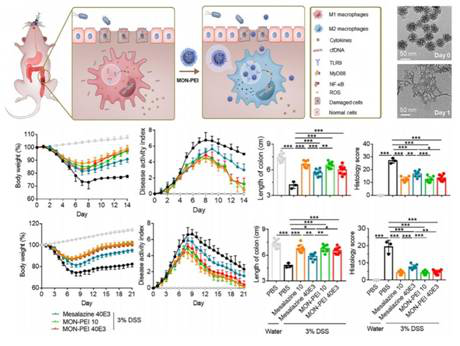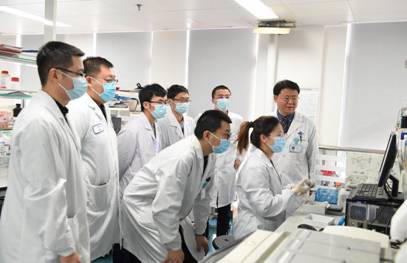With the modernization of people's dietary habits and lifestyle, the incidence of inflammatory bowel disease (IBD) has been increasing rapidly. According to the prediction data of Chinese Center for Disease Control and Prevention, the quantity of IBD patients in China will exceed 1.5 million in 2025. The pathogenesis of IBD is complex. Anti-inflammatory drugs, such as salicylic acid, glucocorticoids and immunosuppressants, are the main clinical therapies of IBD. IBD is prone to recurrence, and long-term medication use brings heavye conomic and social burdens. Therefore, it is of significance to develop new therapeutic drugs with independent intellectual property rights and high cost performance.
She Junjun, Chief Physician from Department of General Surgery of the First Affiliated Hospital of Xi 'an Jiaotong University (XJTU), Professor Leong Kam W., Fellow of National Academy of Medicine and National Academy of Engineering, and Shao Dan, Research Professor from South China University of Technology jointly developed a biodegradable nanomedicine that acts against IBD by scavengingcell-free DNA (cfDNA) and reactive oxygen species (ROS). This drug-free nanoparticulate dualscavenger can significantly down-regulate the levels of cfDNA and ROS in intestinal tissues and peritoneal lavage fluid, which yields high clinical efficacy and biological safety for various inflammatory bowel disease models by comprehensively regulating inflammatory response and oxidative stress. Besides, this nanomaterial has highly efficient targeting and retention effects upon the inflammatory tissues. Compared with mesalazine, a first-line clinical drug used to treat IBD, the nanoparticles can achieve better therapeutic effect with lower administration frequency and higher biological safety. The biodegradable nanoparticles are simple to prepare and convenient to apply, and can further serve as a vector to carry related drugs to realize synergistic and efficient comprehensive treatment of IBD, which has promising prospect for clinical translation.

These research results have been published as an article entitled “A nanoparticulate dual scavenger for targeted therapy of inflammatory bowel disease” in Science Advances (IF=14.143), an academic journal of Science. Shi Chengxin and Shi Feiyu, doctoral students from Department of General Surgery of our hospital, are the co-first authors. Chief Physician She Junjun, Professor Leong Kam W. and Research professor Shao Dan are the co-corresponding authors. Department of General Surgery of our hospital is the first and corresponding affiliation of this article. Med-X Institute and Department of High Talent provide experimental platform.

In recent years, Professor She Junjun has led his team to tackle bottleneck problems in clinical database construction, Da Vinci robot-assisted and laparoscopic surgery, pathogenesis and intestinal microenvironment, combination of medicine and engineering therapy and clinical translation for gastrointestinal tumors. His team has obtained more than 20 funding projects, such as National Natural Science Foundation of China and Special Talent Support Program of Shaanxi Province, etc., and has published over 60 articles in Nature, Science Advances, Annuals of Surgery, Seminars in Cancer Biology, Signal Transduction and Targeted Therapy, Surgical Endosurgery, Chinese Journal of Gastrointestinal Surgery, Chinese Journal of General Surgery and Chinese Journal of Digestive Surgery, etc.
Article link:https://www.science.org/doi/full/10.1126/sciadv.abj2372.